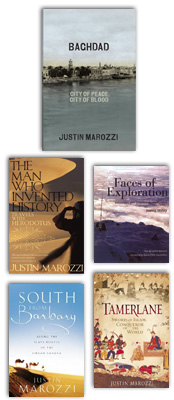Justin Marozzi opens his diary
I’m researching a new history of Baghdad. What strikes you most about this unfortunate part of the world is how extreme violence and bloodshed have been endemic to the city from its foundation by the Abbasid Caliph Mansur in ad 762 to the present day. Baghdad may have been christened the City of Peace but, as Richard Coke wrote in the last history of the Iraqi capital in English, published in 1927, a year after Gertrude Bell’s death, ‘The story of the City of Peace is largely the story of continuous war.’ Hardline Sunnis were impaling and burning alive ‘heretic’ Shia 1,000 years ago. Jews and Christians occasionally got it in the neck, too, and caliphs were always on the lookout for mo re ingenious methods of inflicting pain. An Iraqi colleague is translating a seven-volume Abbasid treatise on torture for me. They have been lopping off heads here for ever. The caliph Hadi (785-786) once interrupted a banquet to rush off and personally behead two of his slave girls who had been caught having an illicit lesbian affair. His companions were horrified to see his eunuch bring the bloodied, bejewelled heads to the table on a platter. A dear Iraqi friend calls from Baghdad. He has already lost several family members in the violence since 2003; four more of his relatives were badly wounded in the huge bombing outside the foreign ministry, some of them blinded by the blast. ‘Perhaps it is our destiny to live like this,’ he says.
***
The highlight of a hellishly hot visit to Baghdad was a down-the-line interview with Sandi Toksvig for her excellent programme Excess Baggage. We discussed some of Herodotus’s observations on the curious sexual customs of foreign peoples. The Greek historian was much taken by the unique post-coital habits of the Babylonians, who used to fumigate their genitals with incense after a bout of lovemaking. Sadly our chat about necrophilia in Ancient Egypt was edited out. Herodotus, who was always up for a story to titillate his audience, related how when a particularly beautiful woman died, her family would only deliver the body to the embalmers after three or four days, when it really=2 0started to pong. This was, he tells us, ‘a precautionary measure’ to prevent lusty embalmers from interfering with the corpse.
***
A colleague in Baghdad, a retired senior army officer, says he’s going to buy property in Amman. ‘Jordan has everything you want in a country,’ he says. ‘First of all, a monarchy. Second, there are no speed limits. Third, no smoking ban, so you can light up wherever you like. And best of all,’ he adds with a steely look, ‘it has the death penalty.’
***
The kerfuffle surrounding the release of the convicted Lockerbie bomber Abdelbaset Ali al-Megrahi reminds me of when I interviewed Gaddafi Junior a few years ago for this magazine. Saif al-Islam al-Gaddafi, son of the Islamic-socialist-cum-pan-Arabist-cum-pan-Africanist-cum-pan-lunatic leader, was staying in the royal suite of Claridge’s at the outset of his campaign to improve Libya’s image in the West. He spoke a lot of nonsense about Libya becoming an ‘oasis of democracy’. Although he said it was ‘unthinkable’ that he would be the next leader, I suspect his passion for democracy will not stop him indulging in a bit of dynastic succession in Tripoli when Daddy’s had enough (40 years and counting on 1 September, incidentally). The then editor of The Spectator, horrified to see Gaddafi swanning around London and being feted by society, made some mischievous changes to my piece and headlined the article ‘Son of Mad Dog’. The Libyans, like most Arabs not known for their love of dogs, went ballistic. I haven’t been back to the country since. A question relating to al-Megrahi’s release from prison occurs. Whose version of events would you be more inclined to believe, that of Mandelson or Gaddafi? It’s an unsavoury choice but my money would be on the Libyan.
***
Thoughts on cricket and ancient history: Thucydides is to Herodotus as Boycott is to Gower. One is rigorous application and puffed-up pomposity, the other easy grace and self-deprecating charm. Both essential in their own way, but be honest. Who would you rather read and watch?
***
A summer in north Norfolk drifts to a close: eating masses of samphire, sailing in Burnham Overy Staithe, swimming in Stiffkey and Wells amid wide skies and stretching sands. A Handel and Scarlatti concert at Salle, a spectacular 15th-century church with extraordinary acoustics. Dancing to Aretha Franklin in Walsingham Abbey. And the Ashes, the Ashes. Long days drunk on cricket, walking from room to room clutching a radio permanently tuned to 198 Long Wave, alternately cursing, fearing, celebrating and occasionally whooping. Panesar and Anderson hanging in there at Cardiff, Blowers and Tuffers discussing lobst er dinners, batting collapses, magnificent Strauss, Broad evolving from boy to man, another hot-to-Trott South African saviour, Freddie bowing out with the electric run-out of Ponting, the fabulous drama of Test cricket against the old enemy. What better way to celebrate the delirium of victory at the Oval than by dashing off to Holkham, the most glorious beach in the country, for a late evening swim. Isn’t it good to have the Ashes back?
Justin Marozzi will be speaking about The Man Who Invented History: Travels with Herodotus, published in paperback this month, at the Edinburgh Book Festival on Saturday 29 August at 8.30 p.m. at Peppers Theatre.

